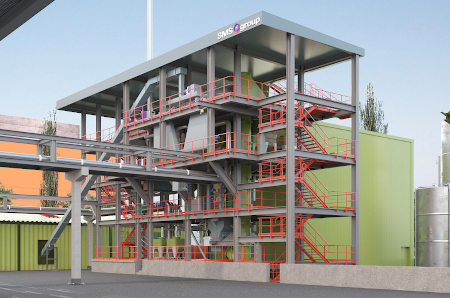On September 17, 2020, SMS group received the approval for the construction of a pilot plant in Vienna, Austria. The new plant is to demonstrate the feasibility of eco-friendly and carbon-neutral production of fuels from waste. SMS group’s project partner BEST – Bioenergy and Sustainable Technologies is going to implement an unprecedented process chain for the generation and use of hydrogen-rich syn-gas at industrial scale in the Vienna district of Simmering at the location of a special-waste incineration plant operated by the local utility company Wien Energie. The core element of the facility, a syn-gas generator built by SMS group is scheduled to become operational in mid-2021.
With the construction of this plant, SMS group is adding another item to its list of projects implemented in line with its New Horizon strategy. Inspired by global trends and developments, the momentum from this initiative is felt in idea finding and concept development with partners and customers. Always thinking one step ahead promotes creativity in solution finding and helps finding viable answers to the global challenges of the future. The project is supported by the Austrian Association for the Promotion of Research (FFG Forschungsförderungsgesellschaft). BEST, a K1 Competence Center in the Austrian COMET program, has taken over the project management. Other partners to the project alongside SMS group include the local utility and public transport companies Wien Energie, Wiener Linien GmbH and Wiener Netze GmbH, paper producer Heinzel Paper, and the Austrian Forest Authority. Scientific partnerships for this project have been established with the Technical University of Vienna and the Luleå University of Technology.
The “Waste2Value” project aims at advancing the reuse of waste for the production of hydrogen-rich syn-gas. Initially the focus will be on using sewage sludge, residuals from the pulp and paper industry and mixes of damaged timber as feedstock. In a further process step, the gas will be synthesized into liquid fuels. The main elements of the project, running until 2023, are the construction and the operation of the pilot plant, and thorough analysis and evaluation of the process results. The research activities within the scope of the “Waste2Value” project will cover the entire process chain from the feedstock to the generation, purification and treatment of the gas, and the synthesis processes through to the refining and use of the FT synthetic fuel in a field trial. The facility will be the first ever of its kind in the world to demonstrate the feasibility of this technology along the complete process chain and at a near-industrial scale. The results gained during the project will provide a solid base for assessing the economic and technological viability of the overall process concept and for the planned scale-up to industrial use by utility company Wien Energie.
Versatile uses of the syn-gas generator
The technology implemented by SMS group is based on a thermal transformation process capable of generating a synthetic gas from waste. This gas mixture can be further processed into different types of energy carriers – green fuels, green gas and green hydrogen. If only renewable materials (timber, waste wood, sewage sludge and biogenic waste, for example) are used as feedstock, also the end products will be 100 percent renewable. Another conceivable process option is to add non-renewable waste - non-recyclable plastics, for example - to the feedstock. This would open up recycling opportunities also for this kind of fossil waste materials.
The new technology is extremely versatile, as the wide range of potential end products shows: fuels for those transportation sectors where batteries are difficult to use (e.g. in agriculture, long-distance haulage, and aviation) can be produced with the same technology as, for example, green gas that can be fed into the natural gas grid, or even green hydrogen for future mobility solutions and industrial applications. During the production of syn-fuel – which, by the way, releases significantly lower particulate emissions than fossil Diesel – valuable chemicals needed in the chemical industry arise as byproducts. A further value-adding option is the eco-friend production of alcohols for the chemical industry from synthetically generated gas. Using sewage sludge as input material even provides the potential for phosphorous recovery from the sludge. Phosphorous is an essential ingredient of fertilizers used in agriculture. There are only two phosphorous mining regions worldwide and, according to estimates, the resources will last only for another few decades.
Thermochemical syn-gas generation is an extremely interesting and promising technology set to become a central element on the way towards green economies.

